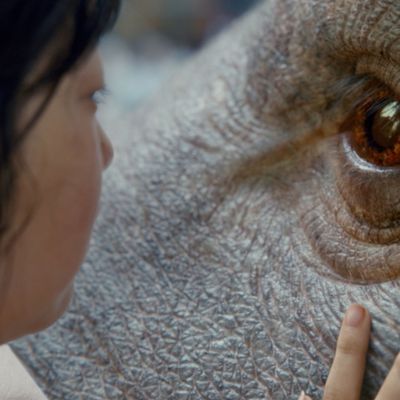
Bong Joon-ho’s Snowpiercer christened a subgenre of film I like to think of as the alternate-reality blockbuster: a kind of big, over-the-top adventure that seemed transmitted from a Hollywood system that hadn’t been completely colonized by franchises. It retained the personal quirks of ’80s and ’90s multiplex fare, while being an international production from top to bottom, with the likes of Chris Evans and Octavia Spencer starring alongside Song Kang-ho. It felt like a throwback, but also like a particularly optimistic vision of a cinema of the future.
The director’s latest, Okja, is a continuation of this in every way, a madcap fable as purposeful as it is unpredictable, that bears no whiff of a committee, for (mostly) better or (occasionally) worse. This time, Netflix has been added to the blender, much to the consternation of the Cannes crowd. (They booed the company’s logo, just as they had the Amazon logo ahead of Todd Haynes’s Wonderstruck.) But it’s hard to imagine how else a film this freewheeling and in open defiance of logic and convention would get made. The story, like its titular gigantic pig-hippo, is a hybrid, nodding to kid-creature teams from E.T. to My Neighbor Totoro, while also dabbling in both farcical and sincere ecodrama. It might be considered an out-and-out family film, were it not for co-writer Jon Ronson’s way around an F-bomb.
Okja opens with a head-spinning introduction to Lucy Mirando (Tilda Swinton) and the Mirando Corporation, a Monsanto-like entity. Mirando is gearing up for a project to breed Chilean “super-piglets” that will be more economical to raise, and will supposedly help address food shortages. As Lucy, Swinton is once again Bong’s Orwellian nightmare woman, a platinum blonde, desperately insecure corporate prima donna with a set of braces behind her bright-pink lipstick, twirling and flouncing her way through her first press conference. It’s a fully realized, ridiculous yet identifiable character from the start; even Swinton enthusiastically lisping the words “best super-piglet” seem to belie a childhood of neglect and loneliness. We’re then treated to a montage of Jake Gyllenhaal, as hammy TV zoologist Johnny Wilcox, getting licked and nearly devoured by a series of animals, accompanied by fun music and cutesy graphics.
The film then flashes forward to quieter times, where teenage Mija (Ahn Seo-hyun) is raising her super-pig Okja in the mountains in South Korea. Okja is part of a “contest” for farmers around the world to grow the biggest super-pig, and when Johnny and the Mirando team come to visit, it’s clear Okja is the winner. But that means she’ll be taken to New York City, and all Mija wants is for her best friend to stay in Korea with her.
So she follows Okja — first careening through Mirando’s Seoul office like a one-girl wrecking ball, then chasing her truck to the airport. Along the way, Okja gets hijacked by an ecoterrorist group led by Paul Dano, who wants to use the creature as a Trojan horse to bring down Mirando. And so the triangle of forces pulling on Okja and Mija is established. The ecoterrorists, particularly Dano and Steven Yeun, are another archetype tuned to strange and exciting new frequencies — pacifists who ambush cops or mall shoppers while crying, “No violence!” When Yeun’s character botches a translation, Dano berates him, screaming, “Translation is sacred!” (The Cannes audience, who saw the film with two sets of subtitles, appreciated this.) At one point, the gang tosses a bag of marbles at their pursuers and watches them fall like dominoes as John Denver’s “Annie’s Song” plays, for some reason.
And so on. The film is packed with so many strange gems of moments, and while a few feel like Bong’s losing the plot (specifically any time Okja decides to loosen her bowels), it always snaps back together. By the time Mija and Dano’s crew find themselves at a hellish slaughterhouse, Bong’s no longer messing around, even if the victims in question are CGI pig-hippos. For all its wackiness, Okja is also a deeply humane film. Even its final boss is never blown up to be any more than a garden-variety capitalist, which is, perhaps, the point.
It also bears mentioning that Darius Khondji’s cinematography is a vivid delight, and like so many Netflix films, deserves to be seen properly on the big screen. But a theatrical release is no guarantee of that: Even at the Cannes Film Festival, a veritable temple to cinema, the projection was improperly matted and had to be restarted after ten minutes. It goes to show: No venue is perfect. But if you’re watching this on your couch, like 99 percent of Okja’s audience will be, check your aspect ratios. Translation is sacred.

